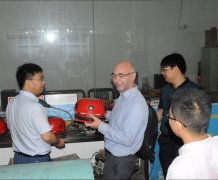articles

Prof Lars Johanning presented by GIEC with micro wave energy converter technology.
Renewable Energy expert delivers international seminar
A leading Renewable Energy expert from the University of Exeter has completed a one year international research initiative, designed to develop new station-keeping systems for marine renewable energy devices (MRE).
Professor Lars Johanning, based at the Penryn Campus in Cornwall, was awarded a Chinese Academy of Sciences (CAS) President’s International Fellowship Initiative (PIFI) funding award in 2021 for his collaborative work with the Guangzhou Institute of Energy Conversion (GIEC) for the innovative Sharp Eagle Device.
With the funding award coming to completion, Professor Johanning held a high-profile lecture around the successes of the project to more than 90 dignitaries.
The seminar, called “Numerical simulation and experimental measurements of coupled mooring systems”, was held virtual.
Professor Lars Johanning outlined field and tank measurements of complex coupled moored systems, discussed the difficulties of in situ monitoring, and presented analysis techniques of fully dynamic mooring simulation tools.
The presentation focused in particular on simulation studies implemented using the commercial fully dynamic simulation software and compared the numerical results with field and tank measurements. In addition, Prof. Lars Johanning introduced a novel mooring shock absorber and the nonlinear mooring system designed for 500kW Sharp-Eagle wave energy converter.
After the report, the participants actively asked questions and discussed with Prof. Lars Johanning about some related problems of wave energy mooring system.
Speaking of the award, Professor Johanning said: “Addressing the global challenge of climate change requires international collaboration, exchanging and developing new carbon neutral technologies that are enabling generating power form renewable energy resources.
“Net Zero targets set by governments around the globe require common approaches and hence close international collaborations. The PIFI initiative enables these collaborations where researchers can exchange and enhance knowledge.”
The project sought to reduce performance and reliability uncertainties of permanent mooring systems for the floating marine renewable energy converter, Sharp Eagle device, through the development of innovative mooring systems.
It used integrated methodologies the dynamic behaviour of mooring systems, including the classification of fluid-structure interactions and their effect on line loading. It also investigated the behaviour of load bearing components subjected to highly dynamic loading regimes, focusing on components made from synthetic polymer materials.
The CAS, PIFI, is a specific funding program to attract talented foreigners to CAS for scientific exchanges and research cooperation. It is open to scientific research personnel from around the globe.
For more information please visit http://english.aircas.cn/education/PIFI
Date: 4 May 2022
